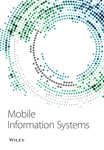Artificial Intelligence-Based Framework for Scheduling Distributed Systems Using a Combination of Neural Networks and Genetic Algorithms
Abstract
High-performance distributed computation has emerged as a new development in which demand for access to resources over the Internet is being delivered to distributed servers that are dynamically scalable. One of the important research issues that must be considered in order to achieve efficient performance is timing. The goal is to map tasks to the right resources and optimize one or more subgoals so that users get the most out of their resources as quickly as possible. Therefore, in this study, in order to find a suitable solution to the scheduling problem and reduce the total time of task completion, a hybrid approach is proposed by neural networks and genetic algorithms. In this hybrid algorithm, the predictive power of artificial neural networks is used to improve scheduling problem task in order to predict the time of tasks completion on resources and the meta-heuristic of genetic algorithm is used in order to find optimal resources for tasks. Experimental results show that the performance of the proposed method is improved in Makespan compared to other methods available in the journals and can adhere to the principles of service quality.
Conflicts of Interest
The authors declare that they have no conflicts of interest.
Open Research
Data Availability
The data used to support the findings of this study are simulated in a random scenario.




